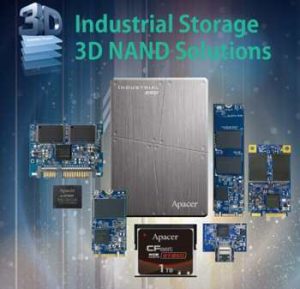FMS: Apacer Showcased Industrial Grade 3D SSD Solutions
With 3,300/2,600MB/s sequential R/W, and CoreLife and management tool CoreAnalyzer2 technologies
This is a Press Release edited by StorageNewsletter.com on August 16, 2018 at 2:20 pmAt Flash Memory Summit, Apacer Technology, Inc. showcased industrial grade 3D SSD solutions and memory technologies, all of which meet the memory requirements of the IoT for capacity, speed, and durability.
The era of ubiquitous interconnectedness is coming. Cloud computing demands large data centers, while edge computing has been on the rise. Data centers continue to be built at the same time that smart devices are seeing growth. With the staggering speed at which the amount of global data is growing, only high-capacity memory equipment can keep up.
Memory equipment has increased in number in this IoT era and is set up in a variety of places, making managing the ways SSDs store data an important task. Meanwhile, smart devices connected through the IoT primarily deal with the reading and writing of small random data, throwing up new challenges to the durability of their memory products.
In response to this amount of data, the company presented memory solutions at the 2018 Flash Memory Summit, including the new storage technology CoreLife and management tool CoreAnalyzer2 for industrial 3D SSDs. Each product comes with increased capacity and durability and makes storage management easier. These products are expected to provide clients with flexibility in storage resolution at competitive prices.
Cross generation 3D industrial grade flash memory giant leap in capacity and speed
Data will undoubtedly be the driving force behind future technologies. Because storage devices are already required to read and write a huge amount of data on a daily basis, their capacity, speed, and reliability cannot be compromised.
The company is launching brand 3D full industrial grade storage solutions that adopt 3D TLC NAND chips, with all SSDs coming with a high capacity option. These products have an NVMe interface and over-provisioning technology on board, and their sequential R/W speed is as fast as 3,300/2,600MB/s respectively. Their ability to opeate within a range of temperatures means that even under severe conditions, these products will still maintain performance. This line of products can be applied in IoT scenarios in a range of fields, including transportation, military, gambling, and health.
CoreAnalyzer2 smart user behavior monitoring further upgraded performance
Smart manufacturing has become the sought-after mode for production. To achieve optimal production efficiency, it requires intricate and diverse industrial storage solutions, which is why the firm has launched the CoreAnalyzer2 technology. It can be applied to most major industrial application platforms to monitor and analyze user behavior and to constantly record the operation conditions of SSDs and the entire OS. Among the items it monitors are temperature, instruction, access location, random or consecutive R/W behavior, data size, 4K alignment, PE count, power failure count, and idle time and frequency. The user can collect data using CoreAnalyzer2 and use it to make minor adjustments to the system program, thus extending SSD lifespan and optimizing general operation performance.
CoreLife improves SSD lifespan by times and improves durability
The smart remote units in IoT applications, such as a sensor required to detect its environment around the clock, mainly write small data. In response to this type of application, the company has launched the CoreLife technology, which is based on the optimized SLC-lite firmware technology. It can execute roughly eight times more P/E cycles than that of MLC chips and 1.25 times more than SLC-lite.
This technology improves product durability and extends their lifespan. It also provides continuous random write performance and is suitable for applications where a large amount of random small data is present and where high durability is required. This technology is a solution for IoT applications in the transportation and logistics industries.














 Subscribe to our free daily newsletter
Subscribe to our free daily newsletter

